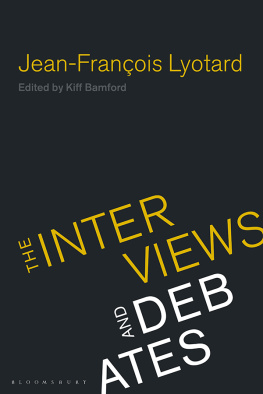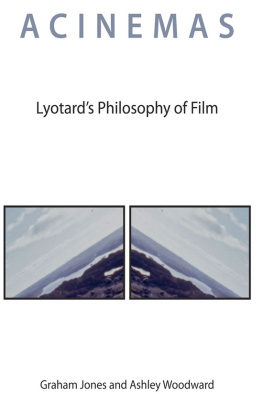Lyotard Jean-François - Expressing the inexpressible in Lyotard and Pseduo-Dionysius [Pseudo-Dionysius]: bearing witness as spiritual exercise
Here you can read online Lyotard Jean-François - Expressing the inexpressible in Lyotard and Pseduo-Dionysius [Pseudo-Dionysius]: bearing witness as spiritual exercise full text of the book (entire story) in english for free. Download pdf and epub, get meaning, cover and reviews about this ebook. City: Lanham;Md, year: 2013, publisher: Lexington Books, genre: Religion. Description of the work, (preface) as well as reviews are available. Best literature library LitArk.com created for fans of good reading and offers a wide selection of genres:
Romance novel
Science fiction
Adventure
Detective
Science
History
Home and family
Prose
Art
Politics
Computer
Non-fiction
Religion
Business
Children
Humor
Choose a favorite category and find really read worthwhile books. Enjoy immersion in the world of imagination, feel the emotions of the characters or learn something new for yourself, make an fascinating discovery.

- Book:Expressing the inexpressible in Lyotard and Pseduo-Dionysius [Pseudo-Dionysius]: bearing witness as spiritual exercise
- Author:
- Publisher:Lexington Books
- Genre:
- Year:2013
- City:Lanham;Md
- Rating:5 / 5
- Favourites:Add to favourites
- Your mark:
- 100
- 1
- 2
- 3
- 4
- 5
Expressing the inexpressible in Lyotard and Pseduo-Dionysius [Pseudo-Dionysius]: bearing witness as spiritual exercise: summary, description and annotation
We offer to read an annotation, description, summary or preface (depends on what the author of the book "Expressing the inexpressible in Lyotard and Pseduo-Dionysius [Pseudo-Dionysius]: bearing witness as spiritual exercise" wrote himself). If you haven't found the necessary information about the book — write in the comments, we will try to find it.
Lyotard Jean-François: author's other books
Who wrote Expressing the inexpressible in Lyotard and Pseduo-Dionysius [Pseudo-Dionysius]: bearing witness as spiritual exercise? Find out the surname, the name of the author of the book and a list of all author's works by series.
Expressing the inexpressible in Lyotard and Pseduo-Dionysius [Pseudo-Dionysius]: bearing witness as spiritual exercise — read online for free the complete book (whole text) full work
Below is the text of the book, divided by pages. System saving the place of the last page read, allows you to conveniently read the book "Expressing the inexpressible in Lyotard and Pseduo-Dionysius [Pseudo-Dionysius]: bearing witness as spiritual exercise" online for free, without having to search again every time where you left off. Put a bookmark, and you can go to the page where you finished reading at any time.
Font size:
Interval:
Bookmark:
Mlanie Victoria Walton is currently an Assistant Professor of Philosophy at Belmont University in Nashville, Tennessee. She earnedher B.A. in philosophy, creative writing, and comparative religions from Sarah Lawrence College in Bronxville, New York, and her M.A. and Ph.D. in philosophy from Duquesne University in Pittsburgh, Pennsylvania. Her area of specialization is historically focused on questions linking late modern and contemporary Continental philosophy with the Neoplatonism and mysticism of late antiquity and the early middle ages. Such specialization has led her areas of competency across the canon on questions of lived experience and the expression of meaningas they surface in aesthetics, ethics, philosophy of religion, critical race and gender theory, environmental philosophy, andEastern thought. Her recent and forthcoming scholarship includeschapters on phenomenology and guerilla gardening, racism and sexual stereotypes in film, and Lyotard on caritas and eros incollected volumes, as well as articles on Lyotards book on Sam Francis, reason and myth in Augustine and Heidegger, and collage art.
Expressing the Inexpressible in Lyotard
and Pseudo-Dionysius
Published by Lexington Books
A wholly owned subsidiary of Rowman& Littlefield
4501 Forbes Boulevard, Suite 200, Lanham, Maryland20706
www.rowman.com
10 Thornbury Road, PlymouthPL6 7PP, United Kingdom
Copyright 2013 by Lexington Books
All rights reserved. No part of this book may be reproduced in any form or by any electronic or mechanical means, including information storage and retrieval systems, without written permission from the publisher, except by a reviewer who may quote passages in a review.
British Library Cataloguing in Publication Information Available
Library of Congress Cataloging-in-Publication Data
Walton, Mlanie Victoria.
Expressing the inexpressible in Lyotard and Pseudo-dionysius : bearing witness as spiritual exercise / Mlanie V. Walton.
pages cm
Includes bibliographical references and index.
ISBN 978-0-7391-8341-0 (cloth) -- ISBN 978-0-7391-8570-4 (pbk.) -- ISBN 978-0-7391-8342-7 (electronic) 1.Lyotard, Jean-Franois, 1924-1998. 2. Lyotard, Jean-Franois, 1924-1998. Differend. 3. Pseudo-Dionysius, the Areopagite. 4. Pseudo-Dionysius, the Areopagite. De divinisnominibus. I. Title.
B2430.L964W35 2013
194--dc23
2013022848
 The paper used in this publication meets the minimum requirements of American National Standard for Information SciencesPermanence of Paper for Printed Library Materials, ANSI/NISO Z39.48-1992.
The paper used in this publication meets the minimum requirements of American National Standard for Information SciencesPermanence of Paper for Printed Library Materials, ANSI/NISO Z39.48-1992.
Printed in the United States of America
D EDICATION
I dedicate this work to my parents, for your love and support, to Clancy and Cliff, for fulfilling Aristotles definition of the highest form of friendship, and to Nikki, Kali, Tal, Tiger, and Vox for teaching me the balance of the art of concentration and the restorative power of play.
This work would not be, were it not for the inspiration and dedicated guidance offered me by Professors Bettina Bergo, Lanei Rodemeyer, and Thrse Bonin.
I NEXPRESSIBLE E XPRESSION ?
Perhaps what is inexpressible (what I find mysterious and am not able to express)
is the background against which whatever I could express has its meaning.
Ludwig Wittgenstein, Culture and Value1
What is an expression that can express that which cannot be expressed? Logicians and grammarians may say that an expression cannot say what cannot be said: it is an impossibilityor, at the very least, a sloppy use of language. But, humanitys intellectual and literary record eloquently and garrulously attests to both the legitimacy of the inexpressible expression and the multiplicity of ways to give it voice. Its every articulation must be meaningful if each so subverts that sensibility by which the logicians and grammarians judge; every judgment of a transgression must begin from the affirmation that it can be understood by the offended rule to be an offense.
While heterogeneous in time, place, and philosophical situation, the contemporary French father of postmodernism, Jean-Franois Lyotard (1924-1998), and the late antique to early medieval, presumably Syrian father of Neoplatonist Christian mysticism, Pseudo-Dionysius (ca. 471-528 C . E .), both rigorously and intimately confront the inexpressible expression.2 Both are provoked by a witness who is silenced by the binding limits of grammatical possibility, even while called to testify to an ineffable. Their examples are remarkably distinct, the holocaust survivor and the religious faithful, yet, they assign equal imperative to their expression. Both define the inexpressible as precisely that which must be expressed in the face of logic that deems it absurd. They both proceed by considerably similar methods and styles. Lyotards postmodernism and Pseudo-Dionysius mysticism, both endeavors bearing the weight of impossibility, are astonishingly analogous: while postmodernism is founded on a secular and rigorous science of stripping away misleading grand narratives in philosophic thinking, it operates with and by a reverence for unknown possibility equal to that in religious mysticism. Both are pedagogic pursuits, spiritual exercises in the originary sense of philosophy as the love of wisdom and its activity as an exercise of seeking it in the face of adversity, into and through perplexity.
Religions intimacy with the inexpressible and its elaboration is far better documented than postmodernisms: God is and creates by the Word, angels communicate without speaking, God spoke to Adam through thunder and lightning, to Moses through a burning bush, to Jeanne dArc through provocative visions and angelic voices. As Umberto Eco sought to explain it: If we are to understand it [Gods communication]... we must conceive of a language that, although not translatable into any known idiom, is still, through special grace or disposition, comprehensible to its hearer.3 These incomprehensible communications are made intelligible by expression in metaphor, riddles, and koans, parables, confessions, testimony, and transcription. Religion, traditionally, has granted greater leniency to these paradoxical expressions and its faithful accept the apology of languages inadequacy to express the meaning and truth of the inexpressible. Even systematic theology, which can be dismissive of mysticism, only truly seeks to offer better transcription, through argumentation, of the incomprehensible. Instead, it is the skeptic, critic, competing religion, and the philosopher thinking reason to be faiths opposite who ask: what makes these expressions inexpressible and strictly repellent to logic and how can meaning operate outside of the rules governing meanings communication?
Philosophy, historically and on either side of the contemporary divide, has been obsessed with these questions, and often to the detriment of the inexpressibles legitimacy. Aristotelian logic, most simply, entails that a valid argument necessitates the truth of its premise.4 The necessity implies a command that this truth be known prior to its demonstration in argument, thus, demonstrable before its demonstration. Hilary Putnam, W. V. O. Quine, and Michael Dummett debated whether the formal validity of arguments must necessitate their premises to be empirically verifiable.5 The logical problem at stake is whether truth can be deduced from premises that can be verified neither empirically nor formally. Hegel even invokes this question when expressing his disdain for the abstraction of law due to its universalization of the concrete.6 His disdain challenges the utility of formal logics complaints about non-contradiction because, sometimes, as in the case of the inexpressible expression, statements are true and contradictory. This opens the door for meaning to be far more than what can be logically expressed. Lyotard, working first within the convoluted framework of legal judgments, seeks to unravel how the witness to the inexpressible is silenced by a tribunal that operates by a logic that exceeds the rigor life unfolds and demands logical exposition when none can be. This logic of the tribunal is the logic that binds us, that keeps us from truthfully calling the meaningful expression of an inexpressible an actual expression. This logic of the tribunal is senselessly rigid and ignores the canonical precedent for expression being far more than its narrow, logical definition. For example, Husserl acknowledges gestures and nonsense in his investigation into meaning and sense, Wittgenstein acknowledges the body and grunts as meaningful expressions, and Lyotard acknowledges the successful communication by a cats swishing tailbut the judge and jury of logic will not allow these expressions to be legitimate testimony.7 The legitimacy of the demands by the logicalbroadly construed, be they demanding truth to be self-certain or empirically demonstrablemust be examined: are any of their means of validation valid under their own rules?
Font size:
Interval:
Bookmark:
Similar books «Expressing the inexpressible in Lyotard and Pseduo-Dionysius [Pseudo-Dionysius]: bearing witness as spiritual exercise»
Look at similar books to Expressing the inexpressible in Lyotard and Pseduo-Dionysius [Pseudo-Dionysius]: bearing witness as spiritual exercise. We have selected literature similar in name and meaning in the hope of providing readers with more options to find new, interesting, not yet read works.
Discussion, reviews of the book Expressing the inexpressible in Lyotard and Pseduo-Dionysius [Pseudo-Dionysius]: bearing witness as spiritual exercise and just readers' own opinions. Leave your comments, write what you think about the work, its meaning or the main characters. Specify what exactly you liked and what you didn't like, and why you think so.






